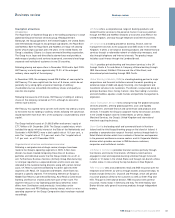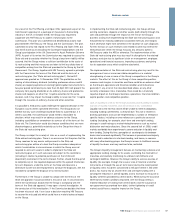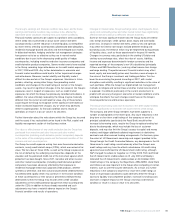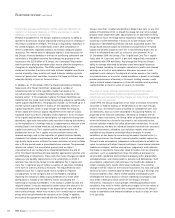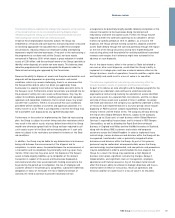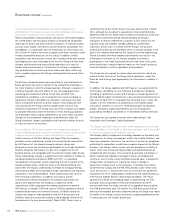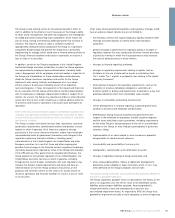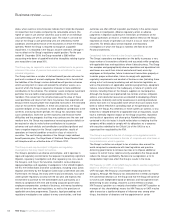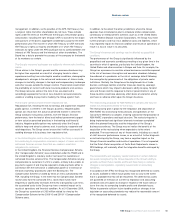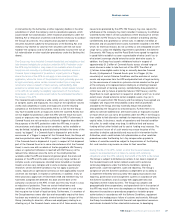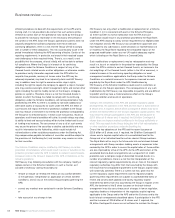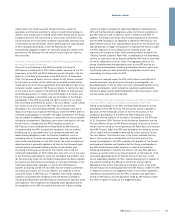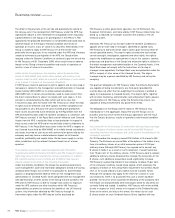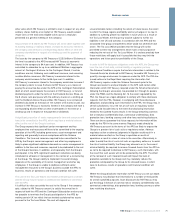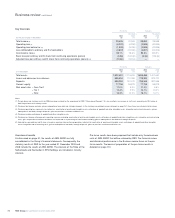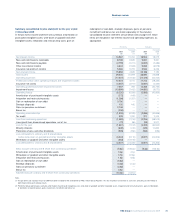RBS 2009 Annual Report Download - page 65
Download and view the complete annual report
Please find page 65 of the 2009 RBS annual report below. You can navigate through the pages in the report by either clicking on the pages listed below, or by using the keyword search tool below to find specific information within the annual report.
63RBS Group Annual Report and Accounts 2009
Business review
The Group is also altering certain of the pension benefits it offers to
staff. In addition to the effects of such measures on the Group’s ability
to retain senior management and other key employees, the marketplace
for skilled personnel is becoming more competitive, which means the
cost of hiring, training and retaining skilled personnel may continue to
increase. The failure to attract or retain a sufficient number of
appropriately skilled personnel could place the Group at a significant
competitive disadvantage and prevent the Group from successfully
implementing its strategy, which could have a material adverse effect on
the Group’s financial condition and results of operations or result in a
loss of value in its securities.
In addition, certain of the Group’s employees in the United Kingdom,
continental Europe and other jurisdictions in which the Group operates
are represented by employee representative bodies, including trade
unions. Engagement with its employees and such bodies is important to
the Group and a breakdown of these relationships could adversely
affect the Group’s business, reputation and results. As the Group
implements cost-saving initiatives and disposes of, or runs-down,
certain assets or businesses (including as part of its expected
restructuring plans), it faces increased risk in this regard and there can
be no assurance that the Group will be able to maintain good relations
with its employees or employee representative bodies in respect of all
matters. As a result, the Group may experience strikes or other industrial
action from time to time, which could have a material adverse effect on
its business and results of operations and could cause damage to its
reputation.
Each of the Group’s businesses is subject to substantial regulation and
oversight. Any significant regulatory developments could have an effect
on how the Group conducts its business and on its results of operations
and financial condition.
The Group is subject to financial services laws, regulations, corporate
governance requirements, administrative actions and policies in each
location in which it operates. All of these are subject to change,
particularly in the current market environment, where there have been
unprecedented levels of government intervention and changes to the
regulations governing financial institutions, including recent
nationalisations in the United Kingdom, the United States and other
European countries. As a result of these and other ongoing and
possible future changes in the financial services regulatory landscape
(including requirements imposed by virtue of the Group’s participation
in the APS and any other government or regulator-led initiatives), the
Group expects to face greater regulation in the United Kingdom, the
United States and other countries in which it operates, including
throughout the rest of Europe. Compliance with such regulations may
increase the Group’s capital requirements and costs and have an
adverse impact on how the Group conducts its business, on the
products and services it offers, on the value of its assets and on its
results of operations and financial condition or result in a loss of value
in its securities.
Other areas where governmental policies and regulatory changes could
have an adverse impact include, but are not limited to:
•the monetary, interest rate, capital adequacy, liquidity, balance sheet
leverage and other policies of central banks and regulatory
authorities;
•general changes in government or regulatory policy or changes in
regulatory regimes that may significantly influence investor decisions
in particular markets in which the Group operates or may increase
the costs of doing business in those markets;
•changes to financial reporting standards;
•changes in regulatory requirements relating to capital, such as
limitations on the use of deferred tax assets in calculating Core
Tier 1 and/or Tier 1 capital, or prudential rules relating to the capital
adequacy framework;
•other general changes in the regulatory requirements, such as the
imposition of onerous compliance obligations, restrictions on
business growth or pricing and requirements to operate in a way that
prioritises objectives other than shareholder value creation;
•changes in competition and pricing environments;
•further developments in financial reporting, corporate governance,
conduct of business and employee compensation;
•differentiation among financial institutions by governments with
respect to the extension of guarantees to bank customer deposits
and the terms attaching to such guarantees, including requirements
for the entire Group to accept exposure to the risk of any individual
member of the Group, or even third party participants in guarantee
schemes, failing;
•implementation of, or costs related to, local customer or depositor
compensation or reimbursement schemes;
•transferability and convertibility of currency risk;
•expropriation, nationalisation and confiscation of assets;
•changes in legislation relating to foreign ownership; and
•other unfavourable political, military or diplomatic developments
producing social instability or legal uncertainty which, in turn, may
affect demand for the Group’s products and services.
The Group’s results have been and could be further adversely affected in
the event of goodwill impairment.
The Group capitalises goodwill, which is calculated as the excess of the
cost of an acquisition over the net fair value of the identifiable assets,
liabilities and contingent liabilities acquired. Acquired goodwill is
recognised initially at cost and subsequently at cost less any
accumulated impairment losses. As required by IFRS, the Group tests
goodwill for impairment annually or more frequently, at external reporting


